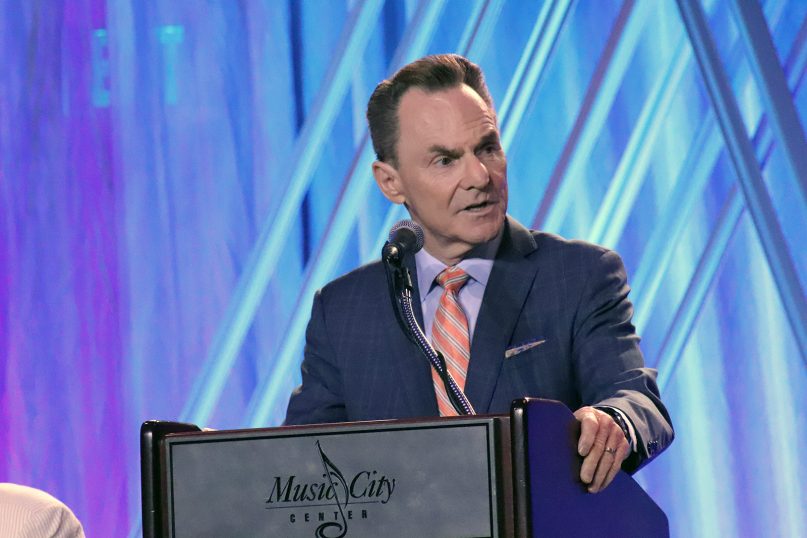NASHVILLE, Tenn. (RNS) — As more than 17,000 SBC messengers gather in Nashville, Tennessee, this week, the nation’s largest Protestant denomination is splintering over persistent racial disharmony, allegations of the mishandling of a sex abuse scandal and growing if unfounded concerns about women serving as pastors.
At the center of these tortuous matters is the Rev. Ronnie Floyd, the denomination’s chief executive, who finds himself not only ill-equipped but increasingly hearing calls for his resignation.
A native Texan, Floyd led a northwest Arkansas megachurch that has grown in the shadows of Walmart’s corporate explosion over the past 30 years. In 2019, he was tapped to lead the denomination’s Executive Committee, an administrative arm charged with the responsibility to act on behalf of the convention between annual sessions. The diminutive, dapper man approaching retirement age was finally elected to his current post after three other denominational executive search committees passed him over.
RELATED: ‘Preserve the base’: Leaked audio of SBC leaders shows reluctance on dealing with sex abuse
On Floyd’s watch, the 15 million member SBC has been convulsing and hemorrhaging from a series of self-inflicted wounds and circular firing squads. The denomination’s numbers continue to decline, as does its political and cultural clout.
Last week, a leaked letter written by Russell Moore, the former leader of the denomination’s public policy arm, identified Floyd among the primary obstacles to addressing the Southern Baptists’ woes. Soon after, a series of audio recordings also leaked, in which Floyd was caught dismissing the needs of abuse survivors — who have borne the brunt of the most recent crisis — in favor of “preserving the base.”
Now, some prominent voices are publicly calling for Floyd’s resignation.
Proof positive that Floyd’s troubles are mounting was a coordinated, albeit clumsy, tweetstorm in which Southern Baptist establishment leaders praised Floyd’s leadership and character online. It’s perhaps prophetic that when evangelical power brokers last circled the wagons in this fashion it was to defend now-disgraced denominational leader Paige Patterson.
To understand the evangelical agony of Ronnie Floyd, you have to go back to the earliest days of his scripted rise in the denomination. From a tiny Baptist college in Central Texas, through a series of small church pastorates along the Gulf Coast, Floyd arrived at his Arkansas church just as the national convention’s battles were moving into the states.
Within a few years, Floyd positioned himself as the conservative alternative to the Rev. Mike Huckabee — then a pastor from Texarkana labeled a moderate by the political machine backing Floyd. Floyd lost to Huckabee by a sizable margin on the first ballot.
Rejected by his peers for the Arkansas convention’s top office, Floyd shifted his focus to the national ladder. He landed a coveted spot on the Executive Committee and quickly began bolstering his fundamentalist bona fides. In 1995, Floyd was elected chairman of the Executive Committee by a narrow four-vote margin. In 2006, Floyd was the preferred SBC presidential candidate of power brokers such as Albert Mohler (now himself a candidate for the convention presidency) and Patterson.
Floyd lost that three-way race to a relatively unknown South Carolina pastor whose record of support for the convention’s funding mechanism stood in stark contrast to Floyd’s dismal history of denominational giving.
The defeats and near-defeats proved no match for the ambitious Arkansan. Floyd had put himself at the forefront of efforts to restructure the behemoth denominational bureaucracy, and in 2014, and after boosting his church’s contributions to the convention ministries, Floyd again sought the convention presidency and squeaked to victory despite facing an almost unknown Asian American pastor from the Baltimore suburbs.
By 2019, Floyd had emerged as the top candidate to become the next president and CEO of the Executive Committee, despite a growing concern that qualified minority candidates were shut out of consideration. It was his bad luck to take the helm at SBC headquarters in Nashville, Tennessee, just as the denomination’s sex abuse crisis was erupting and race relations were unraveling. He nonetheless promised to call the convention to a higher level of integrity, ministry focus and bold evangelistic witness.
Things haven’t gone as planned.
Over the past few months, an insurgent group of fundamentalist sympathizers — calling themselves a Conservative Baptist Network — has seized upon political fear mongering about critical race theory while vowing to “take the ship” of the convention’s entities. (They accompany their threatening tweets with piratical Jolly Rogers.)
Amid the turmoil, Southern Baptists have lost some of their leading female and Black voices, who are abandoning the denomination amid an ever-nastier crusade aimed at preserving the convention’s cultural and ethnic homogeneity.
RELATED: SBC Executive Committee rejects request for system-wide abuse inquiry
But on the eve of the annual meeting, it was Floyd’s response to sexual abuse in the convention that caused messengers to question his leadership. On Monday, Floyd’s committee rejected outright a motion to discuss an expansion of a third-party investigation into its handling of sex abuse, even as his past handling of sex abuse in Arkansas has re-emerged as a focus of concern.
To many, including some of his peers, Floyd is seen as the proverbial dog who caught the car: He finally got the job he always wanted and doesn’t know what to do with it.
There is a sense among some Southern Baptists that something must change if this denomination is to survive — while Floyd represents a dying good-ole-boy network that’s resistant to transparency and accountability. If he is to survive, he’ll likely have to reintroduce himself as a new kind of leader who can bring the convention together before it completely falls apart.
(Benjamin Cole, a layman from Texas and a longtime reform advocate in the Southern Baptist Convention, blogs (pseudonymously) at www.baptist-blog.com. His Twitter handle is @BaptistBlogger. The views expressed in this commentary do not necessarily reflect those of Religion News Service.)





